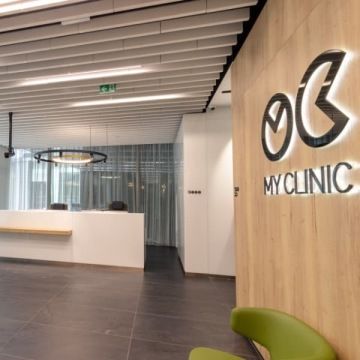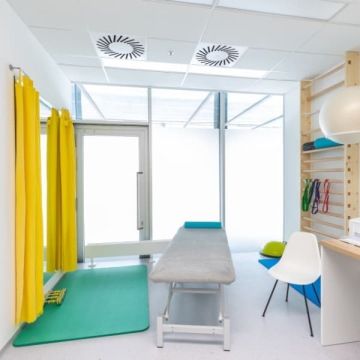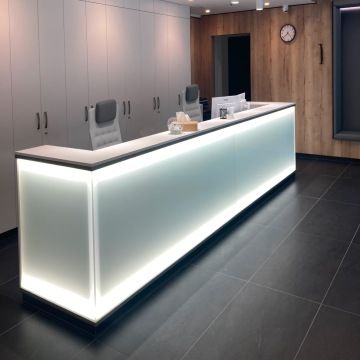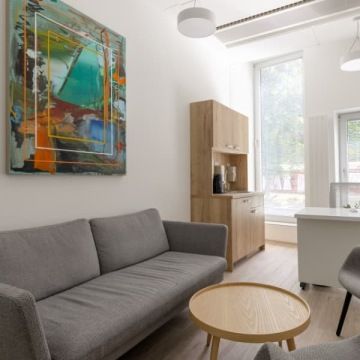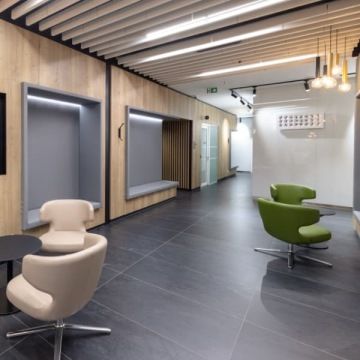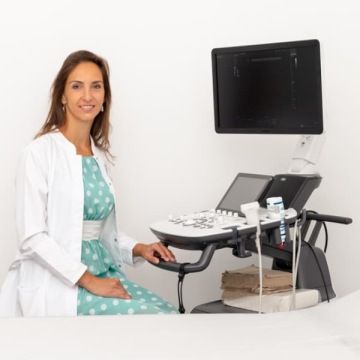Appendectomy
(appendix surgery) - laparoscopic
Appendicitis is an acute abdominal disease characterized by inflammation of the appendix. If it is not treated quickly, which usually involves surgical removal of the appendix, it can rupture and subsequently lead to peritonitis, an inflammation of the abdominal cavity. If the inflamed appendix is not removed in time, there is a risk of serious health complications, including death.
Sonographic (ultrasound) examination is used for the diagnosis of acute appendicitis.
Appendicitis can be caused by an obstruction in the appendix, an injury, the presence of parasites, or tumors. If the doctor diagnoses appendicitis as the source of pain, surgical removal of the appendix is necessary.
Symptoms of appendicitis begin with pain in the the upper central region of the abdomen that moves to the right lower abdomen after about six hours.
Other symptoms of appendicitis may include:
Stabbing pain in the right lower abdomen.
Digestive problems such as diarrhea or constipation.
Nausea and vomiting.
Lack of appetite and bloating.
Increased heart rate.
Fever up to 39 °C.
General weakness, fatigue and abdominal tenderness to touch.
Laparoscopic surgery for appendicitis involves making three small incisions in the abdomen (5-12 mm) and then removing the entire appendix. The duration of the operation varies between 15 and 60 minutes, depending on specific findings during the procedure.
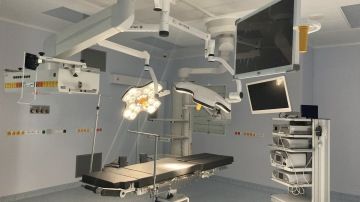
Team of surgeons
Associate Professor
Dr. Barbora East,
PhD, FEBS AWS
Chief of Surgery
More information on the procedure
Laparoscopic appendectomy is performed under general anaesthesia.
After surgery, overnight hospitalization is required, followed by home care, which usually lasts 3 to 10 days. The patient can get up and drink fluids by the evening after the procedure. Stitches are removed on the 8th day after surgery or as agreed with the surgeon.
A period of incapacity for work is usually recommended between 2 and 3 weeks, depending on the nature of the work performed. Sporting activities can be resumed in 3 to 4 weeks.
In the first few hours after surgery, you may feel pain in the surgical wound(s). This pain is completely natural and will be kept under control with painkillers. After you are discharged home, you will take pain medication prescribed by your attending physician. The pain should gradually subside in 24 to 48 hours. Longer-lasting and severe pain may be a sign of complications and you should contact your doctor.
Vomiting is sometimes a side effect of anaesthesia, especially general anaesthesia, and usually subsides within 6 to 12 hours after surgery. Walking is possible a few hours after the procedure.
After laparoscopic surgery, you should avoid sports and strenuous activities for three weeks. Dietary restrictions are necessary for only a few days after surgery, after which the patient can return to a normal diet.
Preoperative preparation includes internal preoperative examinations, blood and urine lab tests, and other necessary examinations as necessary. It also includes a summary of previous illnesses, a list of medications being taken, allergies and an assessment of the risks associated with general anaesthesia.
The patient usually comes in for the planned procedure on the day of surgery to keep the hospital stay as short as possible. From midnight the night before the operation, the patient must not eat or drink anything and must avoid smoking and alcohol consumption. If medication is required, the attending physician must be consulted.
Jewellery, contact lenses and dentures must be removed before the procedure. No make-up or nail polish may be worn.
The price range for the procedure is from CZK 45.000 to CZK 65.000, including anesthesia (or analgosedation) with post-procedure rest/hospitalization. We offer a price discount of up to 50% for the use of available dates.
How our clients rate us
Minimally invasive, maximum care
One-day surgery is a concept that involves non-emergency surgical procedures. Its advantage is quick recovery and minimal pre- and post-op stress.
A modern and comfortable environment
Our clinic is designed with your comfort and safety in mind. We combine modern technologies with a friendly environment to make every visit as pleasant as possible. Come explore our premises, which are as enticing as they are functional.
Are you interested in an examination for the procedure?
Contact our clinic.
Client line: +420 222 900 900


